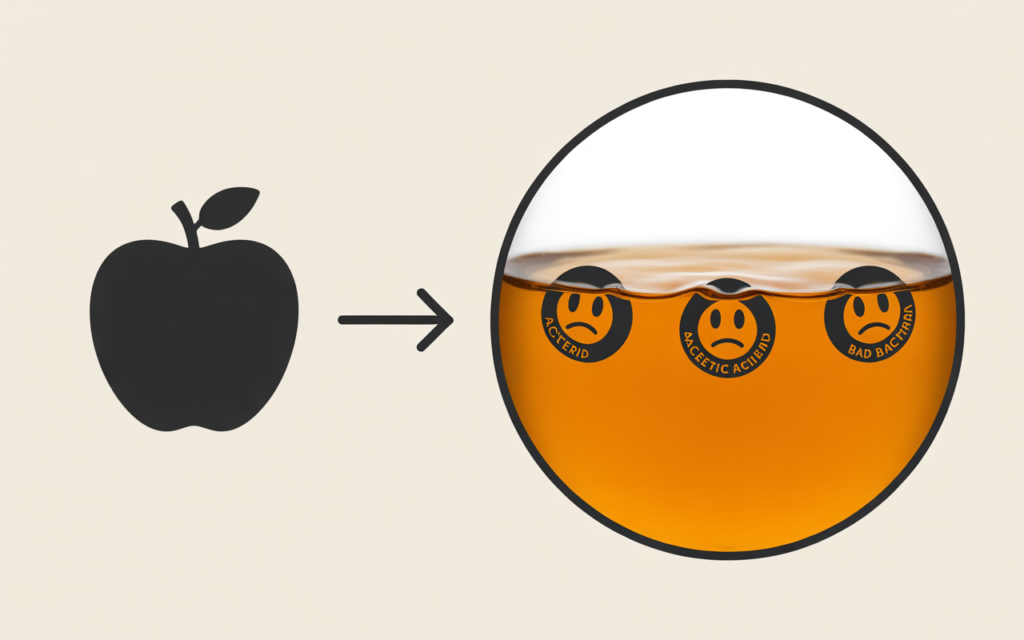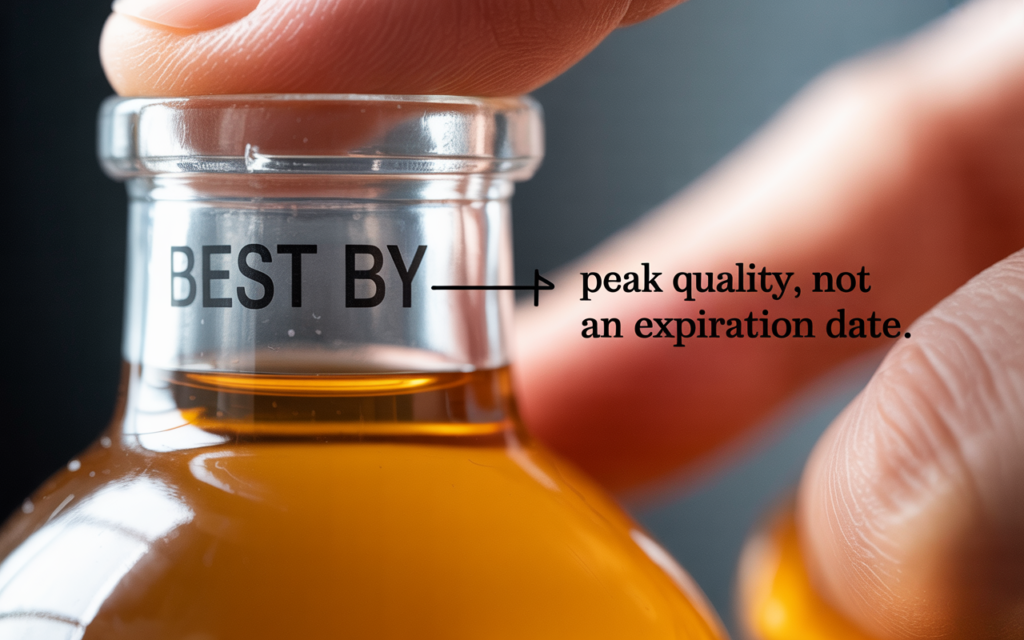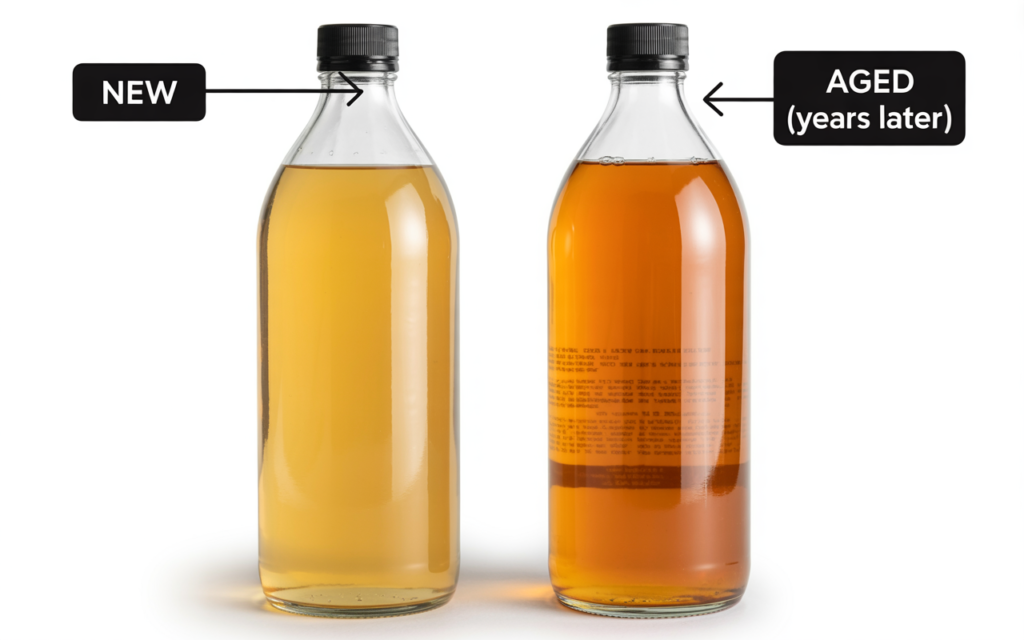In every kitchen pantry, there are certain staples that seem to last forever. Salt, honey, and that bottle of apple cider vinegar tucked away in the corner. You might have purchased it months, or even years, ago for a recipe or a health kick. Now, as you reach for it again, a common and practical question arises: does apple cider vinegar expire? It’s a query that stumps many home cooks and wellness enthusiasts alike, especially when faced with a “best by” date printed on the label that has long since passed.
This guide is dedicated to providing a clear, definitive, and comprehensive answer to that very question. We will delve into the science behind this remarkable liquid, explain the changes you might see in the bottle over time, and offer practical advice on how to store it for maximum longevity. Understanding the truth about its shelf life is key to using this versatile ingredient with confidence. So, if you have ever looked at that bottle in your cupboard and wondered, does apple cider vinegar expire, you are about to get all the information you need to put your mind at ease.
The Science of Self-Preservation: Why Vinegar Lasts
To properly understand the answer to the question does apple cider vinegar expire, we must first look at what it is and how it’s made. Apple cider vinegar (ACV) is, at its core, a product of a two-step fermentation process.

First, crushed apples are mixed with yeast, which ferments the sugars and turns them into alcohol. This is essentially the process of making hard apple cider. Second, a specific type of bacteria, Acetobacter, is added to the alcoholic cider. This bacteria converts the alcohol into acetic acid. It is this acetic acid that gives vinegar its characteristic sour taste, pungent aroma, and, most importantly, its remarkable self-preserving properties.
Acetic acid is a powerful natural preservative. It creates a highly acidic environment with a low pH level, typically between 2.4 and 3.0. This intense acidity is inhospitable to the growth of harmful bacteria and other spoilage microorganisms that cause food to go bad. In essence, apple cider vinegar is its own preservative. The very nature of the product makes it incredibly stable. This scientific reality is the foundation for answering the question, does apple cider vinegar expire.
The Main Question: Does Apple Cider Vinegar Expire in the Traditional Sense?

So, let’s get directly to the point. The most straightforward answer to the question does apple cider vinegar expire is no, not in the way that milk or bread does. It does not “spoil” or become unsafe to consume due to the growth of harmful pathogens. Thanks to its high acidity, a sealed or even an opened bottle of apple cider vinegar has an almost indefinite shelf life from a safety perspective.
You can safely use a bottle of apple cider vinegar years after you’ve purchased it without worrying about it causing illness. This is why it has been used for centuries not just as a food ingredient, but also as a natural preservative for pickling and preserving other foods. Its acidic nature simply doesn’t allow for the kind of bacterial decay that we associate with expiration.
However, while it may not expire from a safety standpoint, its quality can change over time. This is where the confusion often begins and why the question does apple cider vinegar expire is so common. There is a crucial difference between safety and peak quality.
Decoding the Date: What a “Best By” Date Really Means
Most bottles of apple cider vinegar come with a “best by,” “best before,” or “use by” date stamped on the label. This is often the source of the query, does apple cider vinegar expire? It’s natural to assume this date indicates the point at which the product is no longer good. However, this is a misconception.

These dates are set by the manufacturer and are related to the product’s quality, not its safety. The date indicates the time frame during which the manufacturer guarantees the product will retain its optimal flavor, color, and aroma. After this date has passed, you may begin to notice some subtle changes in these sensory characteristics.
So, when you see a date on the bottle, don’t think of it as an expiration date. Think of it as a “peak freshness” suggestion. The vinegar will still be safe to use long after this date has passed. The answer to does apple cider vinegar expire on that specific date is a firm no.
The “Mother”: Understanding the Cloudy Substance in Your Bottle
One of the most common reasons people worry and ask does apple cider vinegar expire is the appearance of strange, cloudy, web-like strands floating in the bottle. This substance is known as the “mother of vinegar,” and far from being a sign of spoilage, it is actually a sign of a high-quality, raw, and unpasteurized product.

What is the Mother of Vinegar?
The “mother” is a complex structure composed of cellulose and the beneficial acetic acid bacteria (Acetobacter) that were used to create the vinegar in the first place. It is completely harmless. In fact, many health enthusiasts specifically seek out vinegar with the mother because it is believed to contain beneficial enzymes and probiotics.
Why Does it Form?
If you buy raw, unfiltered apple cider vinegar, the mother will likely be present from the start, giving the liquid a cloudy appearance. Over time, as the harmless bacteria continue to live in the vinegar, the mother can grow larger or more prominent. This is a completely natural process. If you have a bottle of filtered, pasteurized (clear) apple cider vinegar, it is possible, though less common, for a small mother to develop over time if any residual bacteria are present.
Seeing the mother form should not cause you to worry. It is not mold, and it is not a sign that you need to throw the vinegar away. It’s simply a natural part of the life of unpasteurized vinegar. This is a crucial point in the discussion of does apple cider vinegar expire.
Proper Storage: How to Maximize the Shelf Life and Quality
While we’ve established that the answer to does apple cider vinegar expire from a safety perspective is no, you can take steps to preserve its quality for as long as possible. Proper storage is key.

Keep it Tightly Sealed
The most important storage tip is to always replace the cap tightly after each use. A secure seal prevents oxygen from getting into the bottle, which can accelerate the degradation of flavor and aroma. It also prevents the evaporation of the liquid over time.
Store in a Cool, Dark Place
Apple cider vinegar’s biggest enemies when it comes to quality are heat and light. Direct sunlight and high temperatures can cause chemical changes that will alter the taste and color of the vinegar more quickly. The ideal storage location is a cool, dark place, such as a kitchen pantry or a cupboard that is not located directly next to the stove or another heat source. This simple step is vital for preserving the qualities that make you want to use it in the first place, and it’s a practical part of answering does apple cider vinegar expire.
To Refrigerate or Not to Refrigerate?
This is a common question. Refrigeration is not necessary for storing apple cider vinegar. Its acidic nature protects it from spoilage even at room temperature. However, refrigeration can help to slow down the changes in quality. It can also slow the growth of the mother of vinegar. If you prefer your vinegar to maintain its original clarity and taste for as long as possible, you can choose to store it in the refrigerator after opening. But if you’re short on fridge space, the pantry is perfectly fine. Refrigeration doesn’t change the fundamental answer to does apple cider vinegar expire.
How to Tell if Your Apple Cider Vinegar’s Quality Has Changed
Even with proper storage, an old bottle of apple cider vinegar might not be the same as a fresh one. Here are the sensory changes to look out for. These are not signs of spoilage, but of aging.

Changes in Appearance
- Cloudiness: The vinegar may become cloudier over time, especially if it is the raw, unpasteurized variety. This is usually due to the growth of the harmless mother.
- Color: The color may darken slightly over a long period. A light, golden vinegar might turn a deeper amber color.
Changes in Smell and Taste
- Aroma: The sharp, pungent aroma of a fresh bottle might become slightly more mellow or less intense over time.
- Flavor: The taste may also change. The sharp, acidic bite might soften, and the overall flavor profile could become less vibrant.
If you notice these changes, the vinegar is still safe to use. The question becomes whether it is still suitable for your intended purpose. This is a nuanced part of the does apple cider vinegar expire conversation.
Does Apple Cider Vinegar Expire for Different Uses?
The answer to whether you should use an old bottle of apple cider vinegar can depend on what you plan to use it for. The question does apple cider vinegar expire can have different practical implications.

For Culinary Purposes
This is where the changes in quality matter most. If you are using apple cider vinegar for a delicate salad dressing or a marinade where its specific flavor profile is a key component, an old bottle with a diminished taste might not give you the result you are looking for. It won’t harm you, but it might make your dish taste a bit flat. In this context, while the answer to does apple cider vinegar expire is still no, you might choose to buy a fresh bottle for culinary applications that require peak flavor.
For Health and Wellness
Many people consume apple cider vinegar for its purported health benefits. The primary active compound is acetic acid. While the overall potency might diminish very slightly over many, many years, the acetic acid content remains largely stable. An old bottle will still be acidic and will likely provide the benefits you are seeking. The question does apple cider vinegar expire for health use? Generally, no.
For Household Cleaning
This is the perfect use for a very old bottle of apple cider vinegar whose flavor you no longer enjoy. The cleaning power of vinegar comes from its acidity, which is excellent for cutting through grease, dissolving mineral deposits, and acting as a natural disinfectant. These acidic properties do not degrade significantly over time. So, for cleaning purposes, the answer to does apple cider vinegar expire is a definitive and resounding no. It will remain an effective cleaner indefinitely.
The Final Word: A Pantry Staple with Staying Power

In conclusion, let’s circle back to our original question one last time: does apple cider vinegar expire? From a safety standpoint, the answer is no. Its highly acidic nature acts as a natural preservative, preventing the growth of harmful bacteria and making it safe to use for many years, well past any date you might find on the bottle.
While its quality in terms of taste, color, and aroma may change and diminish over time, it does not spoil or become unsafe. The appearance of a cloudy “mother” is a normal, harmless process in unpasteurized vinegar. By storing it in a cool, dark place with the cap screwed on tightly, you can preserve its quality for a very long time.
So, the next time you find that old bottle in the back of your pantry, you can use it with confidence. Whether you’re splashing it in a recipe, taking it for your health, or using it to clean your countertops, you can be sure that this versatile and resilient pantry staple is ready for the job. The question of does apple cider vinegar expire is one you no longer need to worry about. The simple answer to does apple cider vinegar expire is one of incredible longevity. Your final answer to the query does apple cider vinegar expire is that it is one of the most stable products in your kitchen.